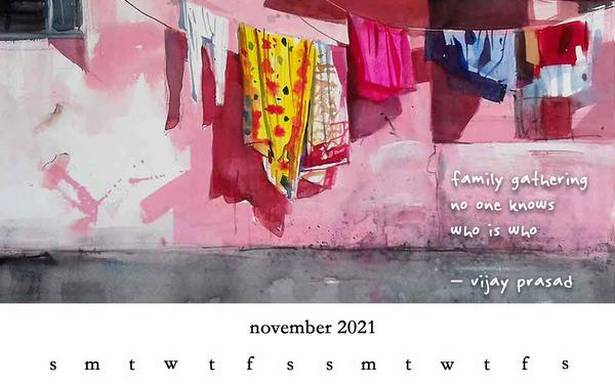ART NEWS
A new year in verse
Brought out by a group of haiku poets, this haikai calendar celebrates the beauty of Indian seasons
The newness of a January sky, the saffron palash that blooms in March, the peacocks that celebrate the arrival of the monsoon… each season is an experience that we cherish and have fond memories of. A haikai calendar, brought out by a collective of haiku poets in India, is a journey through the Indian seasons. Each of the seasons portrayed in the calendar is relatable to someone who has lived in India — take the scent of the mango blossoms in February or the pleasure of walking on a carpet of yellow laburnum in May.
The Triveni Haikai Calendar 2021 is a seamless union of verse and art. For its makers, it was a labour of love. Kala Ramesh, the founder of Triveni (a group for haiku poets the world over), says, “To be able to get haiku, select, design, print, publish, and despatch seemed rather daunting amid the raging pandemic. But it all came together thanks to the tireless efforts of our team members.” Kala, Shloka Shankar and Shobhana Kumar, haiku poets and editors, picked and chose haiku among 55 entries that came in from across the globe. “A haiku is completely inspired by nature. It is about the seasons. And we chose entries that embodied the philosophy of haiku, without slipping into clichés,” adds Kala.
Choosing from a library of images to suit the haiku was the next challenge. Watercolour artist Milind Mulick gave the team access to his works, which complemented the ethos of the verse. Artist Namrata Deshpande too collaborated with the team. Rohan Kevin Broach’s minimalist design adds to the appeal of the calendar. The project couldn’t have been completed without the help of Pradeep Yuvaraj of Team Fountainhead Inc, who undertook the task of printing and shipping over 400 calendars across India and abroad, says Kala.“Haiku has blossomed in India with a number of young people taking to it,” says Shloka. What started as INhaiku in 2013 with 18 self-taught haiku poets has now grown in strength to become INhaiku Triveni. Today, it has over 700 members who come together to learn, revel, and rejoice in haikai literature. Through haiku utsavs, festivals organised for haiku poets and other interdisciplinary art forms, the group spreads awareness on the ancient Japanese form of poetry.INhaiku Triveni organised its first virtual ‘mahotsav’ in August last year, which saw over 90 participants via Zoom. “Triveni has changed the way we think about haiku. We even have very young members, school and college students, who are part of the group,” says Shloka.Haiku are steeped in Japanese aesthetics, adds Shobhana. “They say, if you can write six haiku, then you are a master. When we write haiku here, we adapt to the Indian aesthetic.”Having a haikai calendar on your desk, say the poets, is like bringing a bit of Nature into your room.











